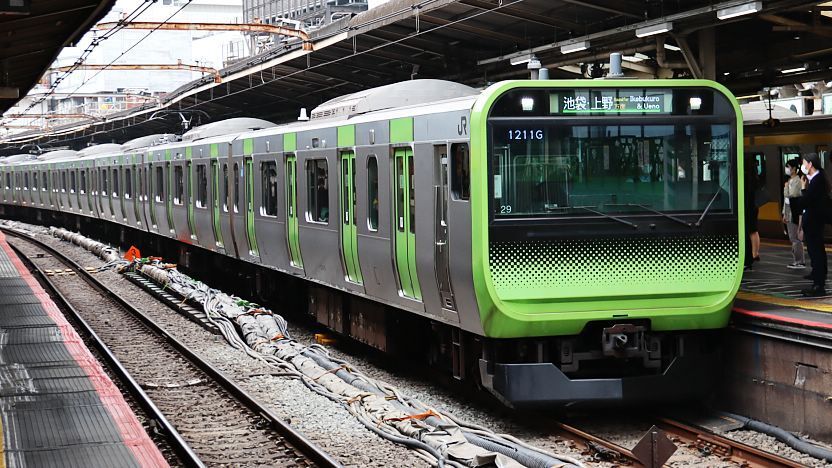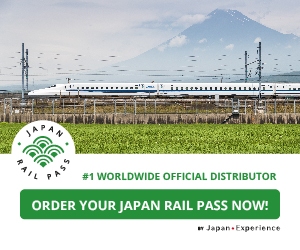Japan Rail Pass (JR Pass)
The Japan Rail Pass (also commonly called JR Pass) is a nationwide rail pass for long-distance train travel in Japan.
The pass can be used only by foreign tourists and offers unlimited rides on JR trains for one, two or three weeks. It comes in two types: ordinary and green car. The latter is valid on green cars (first class cars), which offer more spacious seats than ordinary cars.
The pass lost a lot of its appeal due to a massive price increase in autumn 2023, but it remains a worthwhile product especially to those who do not mind paying extra for the convenient all-you-can-ride privilege, which frees one from having to buy individual tickets for each ride.
| Type | Ordinary | Green Car |
|---|---|---|
| 7 consecutive days | 50,000 yen | 70,000 yen |
| 14 consecutive days | 80,000 yen | 110,000 yen |
| 21 consecutive days | 100,000 yen | 140,000 yen |
Validity
The Japan Rail Pass is valid on:
- JR trains
The pass is valid on almost all trains operated on the nationwide network of JR (Japan Railways), including shinkansen, limited express, rapid and local trains. The map below shows the major train lines that are covered by the pass. - Tokyo Monorail to/from Haneda Airport
- JR Ferry to Miyajima (not including the 100 yen visitor tax)
- Some non-JR trains to access isolated JR lines
The pass is valid on a small number of non-JR trains to access remote, isolated JR lines that would otherwise be inaccessible. However, pass holders may only get on and off at stations that provide a transfer to a JR line. The following non-JR trains may be used:- Aoimori Railway between Aomori, Noheji and Hachinohe to access the JR Ominato Line to the Shimokita Peninsula.
- IR Ishikawa Railway between Kanazawa and Tsubata to access the JR Nanao Line to the Noto Peninsula.
- Ainokaze Toyama Railway between Toyama and Takaoka to access the JR Himi Line and JR Johana Line.
- Hapi Line Fukui between Fukui and Echizen-Hanando to access the JR Kuzuryu Line.
- Local JR buses
The pass is valid on a small number of local buses operated by JR (but not on highway buses). The following can be useful to foreign tourists:- Yamaguchi - Hagi
- Kyoto Station - Ryoanji - Takao
- Kanazawa Station - Kenrokuen
- Tokyo Station - Tokyo Big Sight
- JR buses to Lake Towada
- JR tourist loop bus in Hiroshima
- JR city buses around Sapporo
- JR local bus to Kusatsu Onsen

The Japan Rail Pass is not valid or requires a supplement fee in the following cases:
- Non-JR trains
JR operates the large majority of train lines in Japan, including all shinkansen lines; however, there are also numerous other railway operators. Most of them serve relatively small regional networks or even just single lines, and they are most prominent in the suburbs of Japan's largest cities. Furthermore, most subway lines in Japan are not operated by JR. The Japan Rail Pass is generally not valid on non-JR trains. - Nozomi and Mizuho trains along the Tokaido/Sanyo/Kyushu Shinkansen
A hefty supplement fee is required when riding the Nozomi, the fastest category along the Tokaido/Sanyo Shinkansen and the Mizuho, the fastest category along the Sanyo/Kyushu Shinkansen. The cost depends on the distance traveled and does not differ between seat types (unreserved, reserved and Green; only Green pass holders may use Green car seats). The list below lists the supplement fees for some popular sections:- Tokyo - Nagoya: 4,180 yen
- Tokyo - Kyoto: 4,960 yen
- Tokyo - Shin-Osaka: 4,960 yen
- Tokyo - Hiroshima: 6,500 yen
- Tokyo - Hakata: 8,140 yen
- Shin-Osaka - Hiroshima: 4,170 yen
- Shin-Osaka - Hakata: 4,960 yen
- Shin-Osaka - Kagoshima-Chuo: 9,460 yen
- Hakata - Kagoshima-Chuo: 4,500 yen
In order to ride Nozomi and Mizuho trains, pass holders will have to pay the supplement fee in the form of a "Nozomi Mizuho Ticket", which can be purchased at ticket offices at major JR stations across Japan.
- JR trains using non-JR tracks
There are about a dozen JR trains that partially run on tracks owned by different railway companies. Japan Rail Pass holders will have to pay the fare for these non-JR sections. Please see our special page on JR trains using non-JR tracks for a list of these trains. - Special compartments and berths
Special compartments, such as berths on night trains, are not fully covered by the Japan Rail Pass. A supplement fee has to be paid. See our night train page for more details. - Trains requiring liner tickets
There exist a few suburban "home liner" trains, which require a special "liner ticket" and are not covered by the Japan Rail Pass. However, since these trains are targeted at suburban commuters, foreign tourists are unlikely to use them. Confusingly, there are also a few trains that contain "Liner" in their names, but do not require a liner ticket, such as the Marine Liner and Seaside Liner. These trains are fully covered by the Japan Rail Pass. - Highway buses
The pass is not valid on any highway buses. It used to be valid on a small number of JR highway buses before spring 2013.
- Free seat reservations
Pass holders can make seat reservations for JR trains for free. - Discounts for selected tourist sites and services
Pass holders are able to profit from discounts or gifts at selected sightseeing spots and shops. The discounts are typically 10% or 100 yen and gifts are typically a free postcard. See a list of discounts at the official website.

Green vs. ordinary
Green cars offer larger seats, more foot space and enhanced board service, and they tend to be less crowded than ordinary cars. They are available on most shinkansen and limited express trains and on a small number of local trains. Many travelers find the size and foot room of ordinary seats sufficient, but those looking for additional luxury, should go for the green car.
Upgrading to Green Car possible?
It is possible, but the ordinary rail pass will cover only the base fare. The green car fee and possible shinkansen or limited express supplement fees will have to be paid separately, which usually adds up to a rather large amount.

Can the pass be shared or transferred?
No, the Japan Rail Pass is a strictly personal pass and can be used only by the person whose name is printed on the pass. Pass holders may be asked by railway staff to produce their passports in order to confirm ownership of the pass.
Validity: calendar days or 24-hour periods?
The validity period of the Japan Rail Pass is based on calendar days (midnight to midnight) rather than 24-hour periods. For example: when starting to use a 7-day pass at noon on day 1, it will expire at midnight at the end of day 7 rather than at noon of day 8.
What happens if I am on a train when the pass expires at midnight?
If you happen to be on board of a train at midnight, the pass remains valid until the end of your journey, i.e. until you leave your final station through the ticket gates. This is true even if you transfer trains after midnight. However, if you transfer to a shinkansen or limited express train after midnight, the pass will not cover the express supplement for that train anymore.

Purchase and exchange
There are two ways to purchase a Japan Rail Pass:
- Through the official website
If you purchase the Japan Rail Pass through the official website, a start date within a one-month period is set at the time of purchase (can be modified later). The big advantage of purchasing the pass through the official website is that you can use a designated website for making online seat reservations even before arriving in Japan. Furthermore, you will need only your passport (and no voucher) to pick up your pass in Japan. - Through online and offline travel agents
Many travel agents - online and offline - are authorized to sell the Japan Rail Pass, including Japan Experience. If you purchase your pass through one of them, you will first receive a voucher, which needs to be exchanged to the actual pass inside Japan within three months of purchase. When exchanging the voucher to the actual pass, you set the start date to a date of you choice within a one-month period. An advantage of purchasing the pass through travel agents is that some allow you to purchase the pass in combination with other travel products and earn points and/or discounts.
The sale of the pass at train stations inside of Japan was discontinued in September 2023.
Who can use it?
The Japan Rail Pass can be used only by short term visitors to Japan ("temporary visitors"). It can also be used by Japanese nationals who can prove that they have been permanently residing abroad for at least the past ten years. But it cannot be used by residents of Japan.
Where and how can the voucher be exchanged?
The voucher can be exchanged at designated major JR stations across Japan, including the JR stations at Narita Airport and Kansai Airport. See this page for a list of designated stations and opening hours. Hand your voucher and passport (photocopy not accepted) to the ticket counter staff. After some processing, you will receive your Japan Rail Pass.
Selecting a starting date in the future
When you exchange your voucher to the actual pass, you do not need to start using the pass from the same date. You can select any date within a one-month period as your starting date. However, once the actual pass is issued, the starting date cannot be changed anymore. Those who purchase their pass through the official website select a starting date of their pass at the time of purchase, but can modify it afterwards if needed.

How to use the Japan Rail Pass
See our separate pages about the basics on how to use trains and shinkansen in Japan. Generally, the Japan Rail Pass is your ticket. No other ticket is needed except when using a reserved seat, in which case you will need to get a seat reservation ticket. Seat reservations are free with the Japan Rail Pass.
Rail pass holders can use automatic ticket gates
As of June 2020, pass holders can use the automatic ticket gates to enter railway stations. Previously they had to pass through the manned gate and present their rail pass to the staff.

How to make seat reservations
Japan Rail Pass holders can make seat reservations for free at ticket machines or ticket offices across Japan after exchanging their voucher to the actual pass. Reservations cannot be made on board of trains. Those who purchased their pass through the official website can also make online seat reservations on a designated website. See the pages on how to use trains and shinkansen for more details about how to make a seat reservation.
Are seat reservations mandatory?
On many trains seat reservations are optional, while on most urban and local trains they are not even possible. However, there is a gradually increasing number of trains, which carry only reserved seating and require seat reservations. They include the following trains:
- Limited express trains in the Tokyo region, including the Narita Express to Narita Airport
- Hayabusa and Hayate trains along the Tohoku/Hokkaido Shinkansen
- Komachi trains along the Akita Shinkansen
- Tsubasa trains along the Yamagata Shinkansen
- Kagayaki trains along the Hokuriku Shinkansen
- Limited express trains from Osaka/Kyoto in the direction of Kanazawa, Amanohashidate, Kinosaki Onsen, Tottori and Kumano.
- Limited express trains from Sapporo in the direction of Hakodate and Kushiro.
- Sunrise Seto/Izumo night trains
In addition, Nozomi trains along the Tokaido/Sanyo Shinkansen become temporarily fully reserved during the New Year, Golden Week and Obon holidays.
Are seat reservations recommended?
Many trains do not book out, but some do, especially during rush hours and busy travel periods. For peace of mind it is always recommended to make seat reservations especially when traveling in groups and you wish to sit together. After all, seat reservations are free for rail pass holders. On a few trains reservations are mandatory (see above).
What happens if I miss a train for which I have seat reservations?
This may cause inconvenience to other passengers and the railway company and should be avoided by all means. If it does happen, try to cancel your reservation at a ticket office before it is too late. You can then ride a later train in the non-reserved section or make a new reservation for an upcoming departure.

Does the Japan Rail Pass pay off?
Before the massive price increase of October 2023, the Japan Rail Pass would pay off easily for just a few long-distance rides. Now, however, the pass will be more expensive than regular train tickets or flights for most itineraries. It will pay off only for those traveling very long distances within short time periods - for example Tokyo-Kyoto-Hiroshima-Kanazawa-Tokyo within 7 days - or for people making multiple long-distance side trips from a base.
However, the pass remains a good deal for first-time travelers and others who are intimidated by the complexity of Japanese train tickets, and who do not mind paying extra for the convenience and flexibility provided by the all-you-can-ride privilege of the pass. For example, pass holders won't need to buy tickets whenever they ride trains and can spontaneously make side trips at no additional cost.
Is it useful for urban transportation?
Urban transportation alone will never justify the purchase of a Japan Rail Pass. A pass will only pay off if a lot of long-distance travel is involved. However, in cities that are well served by JR train lines, the Japan Rail Pass can also be useful for urban transportation.
Tokyo and Osaka are two of the few cities where the pass is quite useful thanks to Tokyo's Yamanote Line and Osaka's Loop Line. In many other cities, however, for example in Kyoto, non-JR trains, subways and buses are more convenient but not covered by the Japan Rail Pass.

Questions? Ask in our forum.



